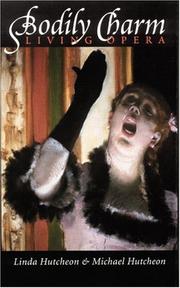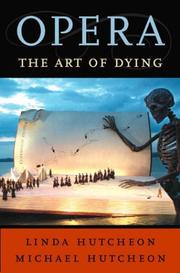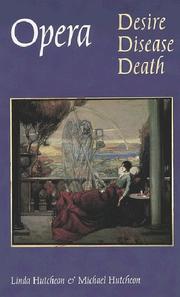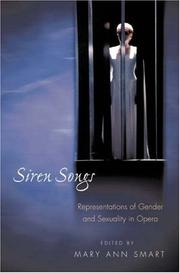| Listing 1 - 8 of 8 |
Sort by
|

ISBN: 0803223854 9780803223851 Year: 2000 Publisher: Lincoln University of Nebraska Press
Abstract | Keywords | Export | Availability | Bookmark
 Loading...
Loading...Choose an application
- Reference Manager
- EndNote
- RefWorks (Direct export to RefWorks)

ISBN: 0674038916 9780674038912 9780674013261 0674013263 9780674335639 0674335635 0674013263 Year: 2013 Publisher: Cambridge, MA
Abstract | Keywords | Export | Availability | Bookmark
 Loading...
Loading...Choose an application
- Reference Manager
- EndNote
- RefWorks (Direct export to RefWorks)
Our modern narratives of science and technology can only go so far in teaching us about the death that we must all finally face. Can an act of the imagination, in the form of opera, take us the rest of the way? Might opera, an art form steeped in death, teach us how to die, as this provocative work suggests? In Opera: The Art of Dying a physician and a literary theorist bring together scientific and humanistic perspectives on the lessons on living and dying that this extravagant and seemingly artificial art imparts. Contrasting the experience of mortality in opera to that in tragedy, the Hutcheons find a more apt analogy in the medieval custom of contemplatio mortis--a dramatized exercise in imagining one's own death that prepared one for the inevitable end and helped one enjoy the life that remained. From the perspective of a contemporary audience, they explore concepts of mortality embodied in both the common and the more obscure operatic repertoire: the terror of death (in Poulenc's Dialogues of the Carmelites); the longing for death (in Wagner's Tristan and Isolde); preparation for the good death (in Wagner's Ring of the Nibelung); and suicide (in Puccini's Madama Butterfly). In works by Janacek, Ullmann, Berg, and Britten, among others, the Hutcheons examine how death is made to feel logical and even right morally, psychologically, and artistically--how, in the art of opera, we rehearse death in order to give life meaning.
Death in opera. --- Opera --- MUSIC / Genres & Styles / Opera. --- MUSIC / General. --- Opera.

ISBN: 0803273185 9780803273184 Year: 1996 Publisher: Lincoln (Nebr.) : University of Nebraska press,
Abstract | Keywords | Export | Availability | Bookmark
 Loading...
Loading...Choose an application
- Reference Manager
- EndNote
- RefWorks (Direct export to RefWorks)
"This fascinating book looks at well-known operas in which love, sexual desire, illness, and death are inextricably linked. The result is an unprecedented view of the operas themselves and the societies in which they were created." "The book focuses on operatic representations of disease and on the ways in which operas associate illness with sexuality, gender, and desire. The authors consider the frequent operatic alliance of tuberculosis with female sexuality (as in Verdi's La Traviata and Puccini's La Boheme); the relation between venereal disease and the moral transgression or failure of male heroes (as in Wagner's Parsifal and Stravinsky's The Rake's Progress); and the association of cholera and homosexual desire in Berg's Lulu and Britten's Death in Venice. A virtuosic chapter considers how assorted operas have identified smoking with sexuality and rebellion. The conclusion considers parallels between earlier operatic representations of disease and recent cultural and scientific representations of AIDS."--Jacket.
Death in opera. --- Diseases in opera. --- Krankheit --- Maladies à l'opéra. --- Medicine in the Arts. --- Music. --- Oper. --- Opera --- Opera's. --- Opéra --- Seksualiteit. --- Sex in opera. --- Sexualité à l'opéra. --- Sociale aspecten. --- Tod --- Ziekte. --- Social aspects. --- Aspect social.
Book
ISBN: 0803223676 Year: 1996 Volume: 17 Publisher: Lincoln : University of Nebraska Press,
Abstract | Keywords | Export | Availability | Bookmark
 Loading...
Loading...Choose an application
- Reference Manager
- EndNote
- RefWorks (Direct export to RefWorks)
Sex in opera --- Diseases in opera --- Death in opera --- Sexualité dans l'opéra --- Maladies à l'opéra --- Mort à l'opéra
Book
ISBN: 022642068X 9780226420684 Year: 2016 Publisher: Chicago The University of Chicago Press
Abstract | Keywords | Export | Availability | Bookmark
 Loading...
Loading...Choose an application
- Reference Manager
- EndNote
- RefWorks (Direct export to RefWorks)
Aging and creativity can seem a particularly fraught relationship for artists, who often face age-related difficulties as their audience's expectations are at a peak. In Four Last Songs, Linda and Michael Hutcheon explore this issue via the late works of some of the world's greatest composers. Giuseppe Verdi (1813-1901), Richard Strauss (1864-1949), Olivier Messiaen (1908-92), and Benjamin Britten (1913-76) all wrote operas late in life, pieces that reveal unique responses to the challenges of growing older. Verdi's Falstaff, his only comedic success, combated Richard Wagner's influence by introducing young Italian composers to a new model of national music. Strauss, on the other hand, struggling with personal and political problems in Nazi Germany, composed the self-reflexive Capriccio, a "life review" of opera and his own legacy. Though it exhausted him physically and emotionally, Messiaen at the age of seventy-five finished his only opera, Saint François d'Assise, which marked the pinnacle of his career. Britten, meanwhile, suffering from heart problems, refused surgery until he had completed his masterpiece, Death in Venice. For all four composers, age, far from sapping their creative power, provided impetus for some of their best accomplishments. With its deft treatment of these composers' final years and works, Four Last Songs provides a valuable look at the challenges-and opportunities-that present themselves as artists grow older.
Composers --- Aging --- Creative ability in old age. --- Psychological aspects. --- Britten, Benjamin, --- Messiaen, Olivier, --- Strauss, Richard, --- Verdi, Giuseppe, --- Last years. --- european history, classical music, performing arts, criticism, creativity, aging, famous artists, giuseppe verdi, richard strauss, olivier messiaen, benjamin britten, operas, falstaff, comedic success, wagner, italian composers, political problems, nazi germany, capriccio, saint francois d assise, death in venice, psychological aspects, creatives, musicology. --- Creative ability in old age --- Psychological aspects --- Britten, Benjamin
Book
ISBN: 9780226255620 022625562X 022625562X 9780226255590 022625559X Year: 2015 Publisher: Chicago London
Abstract | Keywords | Export | Availability | Bookmark
 Loading...
Loading...Choose an application
- Reference Manager
- EndNote
- RefWorks (Direct export to RefWorks)

ISBN: 0674013263 Year: 2004 Volume: *5 Publisher: Cambridge, Massachusetts London, England Harvard University Press
Abstract | Keywords | Export | Availability | Bookmark
 Loading...
Loading...Choose an application
- Reference Manager
- EndNote
- RefWorks (Direct export to RefWorks)
Death in opera --- Dood in de opera --- Mort dans l'opéra --- Death in opera.


ISBN: 0691058148 1400866715 069105813X 1322573816 9781400866717 9780691058146 9780691058139 Year: 2014 Publisher: Princeton, NJ
Abstract | Keywords | Export | Availability | Bookmark
 Loading...
Loading...Choose an application
- Reference Manager
- EndNote
- RefWorks (Direct export to RefWorks)
It has long been argued that opera is all about sex. Siren Songs is the first collection of articles devoted to exploring the impact of this sexual obsession, and of the power relations that come with it, on the music, words, and staging of opera. Here a distinguished and diverse group of musicologists, literary critics, and feminist scholars address a wide range of fascinating topics--from Salome's striptease to hysteria to jazz and gender--in Italian, English, German, and French operas from the eighteenth to the twentieth centuries. The authors combine readings of specific scenes with efforts to situate these musical moments within richly and precisely observed historical contexts. Challenging both formalist categories of musical analysis and the rhetoric that traditionally pits a male composer against the female characters he creates, many of the articles work toward inventing a language for the study of gender and opera. The collection opens with Mary Ann Smart's introduction, which provides an engaging reflection on the state of gender topics in operatic criticism and musicology. It then moves on to a foundational essay on the complex relationships between opera and history by the renowned philosopher and novelist Catherine Clément, a pioneer of feminist opera criticism. Other articles examine the evolution of the "trouser role" as it evolved in the lesbian subculture of fin-de-siècle Paris, the phenomenon of opera seria's "absent mother" as a manifestation of attitudes to the family under absolutism, the invention of a "hystericized voice" in Verdi's Don Carlos, and a collaborative discussion of the staging problems posed by the gender politics of Mozart's operas. The contributors are Wye Jamison Allanboork, Joseph Auner, Katherine Bergeron, Philip Brett, Peter Brooks, Catherine Clement, Martha Feldman, Heather Hadlock, Mary Hunter, Linda Hutcheon and Michael Hutcheon, M.D., Lawrence Kramer, Roger Parker, Mary Ann Smart, and Gretchen Wheelock.
Feminism and music --- Sex in opera --- Women in opera --- Opera --- Sexuality in opera --- Music and feminism --- Music --- Congresses --- Women in opera - Congresses. --- Sex in opera - Congresses. --- Feminism and music - Congresses. --- Opera's --- Seksualiteit --- Uitvoeringspraktijk
| Listing 1 - 8 of 8 |
Sort by
|

 Search
Search Feedback
Feedback About UniCat
About UniCat  Help
Help News
News